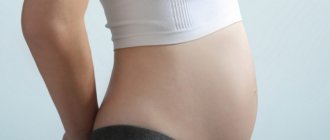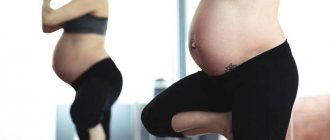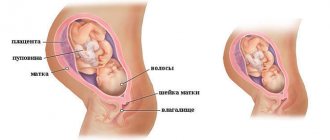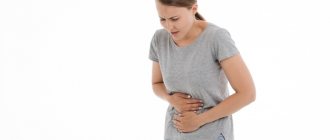This is the 18th week of pregnancy expected by mothers from a medical point of view - the 2nd week of the 5th obstetric month of bearing a child. At this time, the child’s development continues to progress, and changes occur in the appearance of the expectant mother. Differences between obstetric and calendar gestational periods are becoming increasingly noticeable.
Almost halfway through pregnancy
Pain at 18 weeks of pregnancy
Due to the increased load on the spine, pain occurs in the lower back. This is facilitated by a mixed center of gravity and the need to tilt your back back. The nature of the pain can be different: from a slight malaise to severe shooting pains, which are also characteristic of this period. As a rule, acute pain appears at a later stage.
To avoid the appearance of such an unpleasant symptom, you need to buy a support bandage, do a little exercise with special exercises for the back, and rest more often. Lifting heavy objects and standing for long periods of time is contraindicated.
Lumbar pain can develop due to the presence of an infection of the urinary or genital organs. As a result, problems with urination begin. It is important not to get too cold and, if possible, not to visit a public toilet - there are a lot of drafts there, and you can easily catch cystitis.
You need to listen to your body and respond to any incomprehensible symptoms. Thus, bloody discharge from the vagina along with aching, nagging pain in the lower abdomen may indicate an existing risk of spontaneous abortion.
Discharge
At week 18, the amount of leucorrhoea may increase sharply. If the abundance is not accompanied by obvious symptoms of genital tract disease: itching, redness and peeling, a woman should not worry. A change in color, smell and consistency is a signal to visit a gynecologist.
Frozen pregnancy
Fading pregnancy is a big problem for the mother, not only psychologically, but also physically. This danger lies in the fact that the fetus stops developing in the womb - it is not rejected, remaining inside. If this is the first pregnancy and the girl was unable to identify the problem in time, surgical intervention will be required.
The 18th week differs from the rest in that from this period it is possible to independently monitor the child’s condition based on his activity
The most dangerous period is the 1st trimester, because the embryo at this stage is very vulnerable to any negative influence from the outside. The critical period according to medical statistics is from 16 to 18 weeks. What could trigger this tragedy:
- smoking by a pregnant woman;
- drinking alcoholic beverages;
- narcotic substances;
- genetic abnormalities, heredity;
- infections;
- hard work;
- harmful habitat.
To understand that something is wrong with a child is only possible if he is active - the 18th week is a long enough period to identify the problem on your own. At earlier stages there may be the following signs:
- absence of toxicosis (especially if this is a problem for a woman);
- hard breasts;
- spotting (from red to brown).
The problem can be accurately diagnosed using an ultrasound examination: the doctor will not hear the heartbeat and will not see signs of activity. The patient is urgently prescribed measures to stabilize her condition: the fetus is scraped out of the uterine cavity.
During an ultrasound, the doctor will see all possible pathologies and assess the condition of the fetus.
This is necessary, as acute inflammatory processes can occur, even rotting. After surgery, treatment with antibiotics is necessary. You shouldn't plan your next pregnancy for the next year.
What's happening
During this period, the development of the child’s brain continues, and subcutaneous fat gradually accumulates. By the end of the 18th week of pregnancy, the external and internal genital organs of the fetus will be fully formed, and during an ultrasound you will be able to find out who has settled in your tummy.
The baby’s immune system is also improving: by the 18th week of pregnancy, his body begins to produce interferon and immunoglobulins, designed to protect the baby from infections and viruses.
A pattern unique to him has appeared on your baby’s fingers. The rudiments of teeth have formed, the child is able to hear, but the development of the organs of vision has not been completed, but by the 18th week of pregnancy the baby can already distinguish between light and dark.
18th week of pregnancy: fetal development
The height and weight parameters of your baby at 18 weeks are about 14 cm and 150 g. What is typical for the baby’s development during this period:
- The brain is actively developing. There are more neurons, the deepening of convolutions and grooves progresses. A myelin sheath appears around the nerves. Its task is to protect the transmission of impulses;
- The thymus (thymus gland) is formed. Its location is in front of the neck, its function is to produce the formation of lymphocytes - important components of the normal functioning of the immune system;
- immunoglobulin and interferon are actively produced - they are responsible for protecting the child from harmful bacteria and infections in the mother’s body;
- the adrenal glands are activated - at the moment, they are the largest endocrine gland;
- The baby's fingers already have clearly visible phalanges, and the bones are strengthened. Interesting fact: fingerprints are already clearly visible on the pads of your fingers. The nail bed has formed.
Your baby is the size of a mango
Every day the child develops facial expressions more and more actively - he makes faces, grimaces. The ears are already in the desired area of the head, and the gums contain molars (their rudiments). Their location is lower than dairy.
The vocal cords have completed their formation. The baby's leg is only 2 and a half centimeters long. It is interesting that the ratio of the length of the foot to the lower leg and the thigh appears in the womb and is maintained throughout life.
The child’s active movements are good for him: the muscular system is strengthened, the hemispheres of the brain develop. What does the child do during this period? He sucks his thumb, rolls over, can cross his legs/arms, touches his face and everything around him. There is enough space for him for now, but the tremors are already quite noticeable for the mother.
Although the baby's eyes are not yet open, he is able to react to flashes of bright light. In addition, he already clearly hears and recognizes loud and quiet sounds. Future young parents are recommended to talk to their child, read fairy tales, and sing lullabies. Use all your affection and convey your intonation to your baby - and you will feel how he calms down and calms down.
The baby's skin is bright red - this effect is given by blood vessels that are visible through the thin and delicate skin. The surface of the dermis is covered with a specific lubricant, the task of which is to protect it from the negative effects of the aquatic environment.
Already at this stage you can distinguish the baby’s facial expression
At the final stage, the genitals of a small person: in girls, the fallopian tubes and uterus are already formed. Boys can already boast that they are male - the external organs are already clearly visible, but the testicles are still in the abdominal cavity.
Your baby is the size of
The size of the fruit is equal to that of a mango: about 14 cm long and 150 g body weight.
Appearance
The child looks more and more like a baby - his face takes on human features, and the first picture of an alien from the first ultrasound can be hidden as a keepsake. The only differences between a newborn and a baby are weight and growth parameters.
Subcutaneous fat, which is actively produced, will very soon remove transparency from the skin and smooth it out. There will be no more red, wrinkled man - just a tiny chubby man with a dimpled chin and a round belly.
The ultrasound procedure is extremely exciting for a woman.
Growth processes are normalized: now the large head grows much more slowly, the limbs become longer, and the body also accelerates growth. The baby’s body begins to grow hair: thin, fluffy and almost invisible to the eye.
In medical practice they are called "lanugo". This is direct evidence that the hair follicles are actively working. Like lubricant on the skin, the hairs are designed to protect the child from the negative effects of the aquatic environment in which he is constantly located.
Slowly but surely, over time, the child will get rid of these two protective factors - only small areas will remain in the groin area and in the folds of the joints of the legs and arms. As for the hair on your head, there may already be quite a lot of it. There are eyelashes on the eyelids.
Nervous system
The work of the central nervous system (CNS) begins to take effect. She controls the child's movements and controls his coordination. The baby may consciously touch the umbilical cord, turn its head, or begin to jerk its legs.
The development of the cerebral cortex (gray matter) progresses. The little person is developing and getting smarter every day. The child has reflexes that help him survive: grasping, swallowing, and the ability to suck. The beginnings of the instinct of self-preservation will soon appear.
At the appointment, the doctor will talk about all the questions that interest the expectant mother.
Sense organs
The child’s senses are responsible for the child’s perception of the world around him. All are formed by the 18th week, but not all are active. For example, the baby does not hear fully, although he already has ears.
At this stage, the formation of auditory ossicles has already completed, which will help him distribute sounds - he will perceive noise at the same level as an adult. After a couple of weeks, the baby’s hearing will turn into ideal – the inner ear will function as it should.
The ear cannot clearly recognize new sounds, but separates vibrations. Gentle stroking, kind words from mom and dad, songs, and fairy tales will have a beneficial effect on the baby’s well-being. If we talk about the eyes, it is worth considering that the retina of the eye has increased sensitivity, although the eyelids are still closed.
For example, if you direct the beam of a flashlight at your stomach, you will feel a “dissatisfied” movement inside, and your mother will feel active tremors. The child's tactile sensations are sufficiently developed - he begins to explore the space around him, study his body.
Muscles and bones
The bones and spine become stronger every day, and muscle tissue develops very quickly. By week 18, the ribs, skull, and paired bones are already fully formed. The joints continue to improve - the legs become longer and stronger.
Alcohol should be avoided during preparation for pregnancy and for its entire duration.
Facial expressions are very mobile: a smile, squinting, lips with a tube, grimaces of dissatisfaction, yawning. As the body continues to debug brain impulses, some facial muscle movements occur involuntarily.
Internal organs
The organ system continues to master its basic functions and also grow rapidly. The gastrointestinal tract system is already processing amniotic fluid, despite the large amount - approximately 400 ml per day.
Intestinal peristalsis is developed - the first feces (meconium) appear in it. The function of bowel movement will be performed after birth. The kidneys produce urine, and the baby uses the bladder to pee. This is a frequent process, but the expectant mother should not worry - the waters are sterile due to rapid renewal.
The normal heartbeat at this stage is about 170 beats per minute, which is much faster than the mother’s heartbeat.
Determination of gender
The 18th week is the period for more accurately determining the sex of the unborn baby. The dimensions of his body are now ideal: he does not need to choose a comfortable position in the cramped cavity of the uterus, thereby hiding the genitals (3rd trimester).
But you don’t need to look closely – the gender is already clearly distinguishable. In boys, the testicles begin to descend (from the abdominal cavity into the scrotum), and in girls, the uterus and fallopian tubes are formed.
At this stage, the sex of the child becomes clear
18th week of pregnancy: Ultrasound
Mandatory scheduled ultrasound is prescribed between 18 and 20 weeks. This procedure will help identify possible pathologies and developmental defects (Down's disease or heart disease). The parameters of the child’s body and their correspondence with the gestational age are determined. The doctor measures:
- Head circumference;
- stomach;
- forehead and back of the head;
- limb length;
- parameters of the femur, humerus, shins, and forearm.
The placenta should be attached to the posterior wall of the uterine cavity. Norms for its attachment: at least 7 cm before the exit from the uterus from the bottom of the placenta. During an ultrasound examination, the date of birth, the actual age of the fetus, and presentation are clarified.
What it is? In simple terms, the part of the body that is closest to the cervix is indicated. It is considered correct if it is the head - the largest part of the body. Therefore, when the head passes, the body pushes through faster.
The management of labor depends entirely on the presentation. If this issue is not yet clear (the baby is located diagonally), do not worry - the result will be clear already at 30 weeks of pregnancy.
The following parameters are also important: uterine tone, amount and color of amniotic fluid, size of the uterine cervix. If pregnancy occurs with a high risk of chromosomal abnormalities, screening is necessary.
A triple test is carried out: for the level of hCG, estriol and the amount of alpha-fetoprotein. It is important to remember that the test result is not a diagnosis, but only a referral to a specialist to further solve the problem.
18th week of pregnancy: medical examination
What procedures should be performed and which doctor should be visited at 18 weeks of gestation? First of all, a gynecologist. If a woman is registered on time, this period should mean the 4th appointment.
During a visual examination, an assessment is made of the discharge and the general condition of the uterine cavity; a smear is necessarily taken for microflora and cytology. The first identifies inflammatory processes and harmful microorganisms, the second gives a detailed report on the nature of the cells from the cervix.
The second mandatory examination by a therapist: they measure your blood pressure and calculate your heart rate. Be sure to weigh yourself and measure your abdominal circumference. An assessment of the location of the uterus and standing height is given. Listen to the baby's heartbeat. As for laboratory and clinical tests, urine is taken for a general analysis, blood from a vein and finger (general, for sugar, etc.).
Positive emotions are what a pregnant woman needs at any stage
Analyzes
A urine test allows you to evaluate the functionality of the kidneys, and a blood sample helps to exclude or confirm anemia. Poor hemoglobin levels lead to oxygen starvation and also contribute to the development of anemia in the baby after birth.
To exclude chromosomal abnormalities, tests are taken, the so-called “triple test” for the level of hCG, AFP and NE (unconjugated estriol). If there are deviations from the norm, there is a possibility of Down syndrome in the child, hydrocephalus.
Don't panic—these results are not a final verdict. You will most likely be referred for further testing.
Nausea
By the 18th week of pregnancy, most women stop having symptoms of early toxicosis. In the remaining 12-20% of pregnant women, toxicosis can continue until the beginning of the third trimester. This phenomenon is associated with unstable hormonal levels and emotional overload of the nervous system. Toxicosis accompanied by vomiting is called hyperemesis gravidarum. Because of vomiting, a woman cannot eat normally, she loses significant weight and even risks losing her child.
If at 18 weeks you experience nausea and vomiting, or a stomach ache, you should inform your doctor. He will prescribe a course of treatment, which will most likely have to be completed in a hospital.
To alleviate the condition during an attack of nausea, the following exercise will help:
- Place one hand on your chest, the other on your stomach.
- Take several deep breaths and exhalations for 3-5 minutes.
If you have nausea and other signs of early toxicosis, you should rest more often and follow a drinking regime. You need to eat often, but little by little, and include foods high in magnesium, zinc, and vitamins in your menu.
Recommendations
There are some important tips for the expectant mother regarding changing habits:
- Follow the rules of personal hygiene: wash your hands after going outside. You need to avoid visiting crowded places to avoid infection with viruses. It is worth remembering that even a minor respiratory disease can cause negative complications on the child’s body;
- say firmly “no!” self-medication. Do not take medications without the doctor’s knowledge; many potent substances can harm the baby’s fragile body;
- It is recommended to measure your weight regularly. Write down all additions and keep a graph. It would be good to purchase bathroom scales - they can accurately measure all changes;
- listen carefully to how you feel: there should be no severe pain, nausea, or vomiting. If there are symptoms of late toxicosis, which the expectant mother does not need at all, it is better to consult a doctor. If nausea and vomiting are present, these may be symptoms of food poisoning;
- Heartburn often appears when the diet contains a lot of fatty, spicy foods, as well as chocolate. This is precisely what provokes the appearance of this unpleasant symptom - they relax the food sphincter;
- It is better to eat food in small portions so as not to overload the stomach. In addition, eating a lot of food that is difficult to digest can lead to constipation;
- If a woman works, she needs as little tension as possible: don’t be nervous, don’t be stressed.
Pregnancy should be a bright moment in a woman's life
Avoid any conflict situations, do not argue or swear. The atmosphere in the family is the key to the peace of mind of the future baby. In addition, there is still a risk of spontaneous miscarriage, and stress factors often lead to its occurrence.
18th week of pregnancy: nutrition
It is recommended to take the issue of nutrition very carefully. It should be balanced, healthy, filled with essential microelements. In order not to gain weight, you should not lean on carbohydrates and flour. What you need to completely exclude from your diet:
- salty foods, they promote fluid retention and provoke swelling;
- smoked meats;
- fatty foods, as they cause constipation and heartburn.
Consume plenty of dairy and fermented milk products - they will strengthen the child’s bones and provide the growing body with calcium. The priority should be the most healthy fresh vegetables and fruits, cereals, lean meat (ideally chicken).
Freshly squeezed juices, fresh juices, and simple tomato juice are useful. If you cook dishes in a double boiler or pressure cooker, you can get the most healthy food possible - the food practically does not lose its nutrients.
It is worth remembering about the assimilation of vegetables and fruits: it is advisable to eat those that grow in the country. Citrus fruits are less digestible and can cause allergic reactions. An element such as protein is a real storehouse for the growth and development of your baby.
A pregnant woman's diet should contain all useful and necessary elements.
It is found in many types of fish, poultry, eggs, and legumes. You can treat yourself to salmon or trout. A large amount of the necessary folic acid is found in apple juice, beets, cabbage, and celery. Approximate ratio of daily nutrition, compiled by experts:
| Cereals, carbohydrates | 200 g |
| Meat | 150 g |
| Dairy | 3 glasses |
| Fruits | 2 glasses |
| Vegetables | 5 glasses |
Weight at 18 weeks of pregnancy
What harm does excess weight during gestation cause to a mother’s body? The fact is that the 18th week is the beginning of the 2nd trimester, and there is still a long time ahead before giving birth. It is much more difficult for obese girls to physically bear and give birth - a fact recognized by doctors.
In addition, it will be very difficult to return to a wasp waist. Of course, it is not easy to tame your appetite, especially if you have had severe toxicosis in the past. But still, it is worth listening to the advice of doctors and nutritionists: the norm for weight gain at 18 weeks is 6 kg.
From this date, some women, especially those carrying twins, can wear a bandage
Bandage and shoes
Even fashionistas are better off hiding stylish high-heeled pumps in a distant closet - they definitely won’t be needed while carrying a child. At week 18, the load on the back, lower back, and legs increases. Swelling of the extremities often appears. The best option is light, comfortable shoes (ballet flats) or flat boots (according to the season).
To support your stomach and prevent (or reduce) stretch marks, it is recommended to purchase a special bandage.
First of all, consult your doctor.
A bandage is an orthopedic product; there are a huge number of different models. If you are determined to buy, decide on the appropriate option and try it on. It is better to refrain from purchasing online.
“Don't touch my belly! »
A woman's round belly attracts the attention of others. Friends very often try to touch it, which causes discomfort in the pregnant woman. There is no need to be patient - speak directly about the fact that you shouldn’t do this, you don’t like other people’s touches. It's too personal. Allowing strangers to touch the belly is as if the personal space of mother and child is being violated.
Pregnant woman has personal space
Preparing for childbirth
Already at this time, you can begin preparing for the upcoming meeting with your baby. To give birth quickly and easily, you need to do light gymnastics and keep your muscles toned. If you do a set of exercises in a timely manner, after childbirth you will not have to restore your previous shape for a long time. “Kegel exercises” are effective.
What is the methodology? Objective: train the pelvic muscles. It is quite simple to do: they are compressed and unclenched. In practice it looks like this:
- you need to sit up straight, thus distributing your body weight on your pelvis. Important - do not lean on the sacrum!;
- squeeze the muscles of the perineum as if holding something between your legs;
- hold the muscles in this tension for about 10 seconds;
If you don’t have any special skills or experience, be content with 5 repetitions the first time. The optimal number of repetitions for 1 approach is about 30. Perform no more than 3 approaches per day. If done regularly, the result will not be long in coming - the effect will be felt in a few weeks. This is a good way to strengthen your pelvic floor.
You should not take any medications without your doctor's knowledge.
In addition, regular exercise will help avoid disorders in your sexual life and prevent such an unpleasant phenomenon as urinary incontinence in the later stages.
Before you start doing this type of exercise, consult your doctor. Contraindications are possible if women have an obstetric pessary applied to the cervix - a plastic device to support the uterus.
Good complexes are provided by professional trainers in courses for pregnant women. This is a mandatory program for pregnant women, which is available in every private and public clinic. There you can also get the basics of knowledge on partner childbirth.
Medicines
It is prohibited to take any medications without consulting your doctor. At week 18, the placenta performs the function of protecting the baby from the negative effects of drugs. Antibiotics, painkillers, and anti-seizure drugs are strictly prohibited.
If a woman was previously prescribed the hormonal medicine Urozhestan, it can be discontinued at week 18. There is no longer any need to continue the pregnancy, the most dangerous time is behind.
Sex
Let's start with the good: intimate intimacy is possible and necessary! These are new emotions, sensations, pleasure for both partners. The tummy is not very big, there cannot be much discomfort. Sexual relations at 18 weeks will bring partners even closer together; the myth about harm to the child has no basis - the joy hormone endorphin is released into the mother’s blood, which of course is passed on to the baby.
Sex will help mom get good emotions
Now about the contraindications of sex at 18 weeks of pregnancy:
- it is better to abstain if the uterus is toned;
- there is a risk of miscarriage, accompanied by bleeding and cramping pain;
- in the presence of sexually transmitted infections;
- the placenta is located low according to ultrasound readings;
- amniotic fluid leaks;
Sometimes the reason for abstinence can be a multiple pregnancy.
Feel
Now the woman feels more and more like a mother, because she feels the baby’s movements. Often at this stage the baby is actively moving, but some expectant mothers say that at the 18th obstetric week of pregnancy there are no movements yet. If the doctor listens to the baby’s heart without any problems, then there is no reason to worry: some women feel the fetus only at 20 weeks.
Discharge at the 18th week of pregnancy became more abundant, so it is necessary to carefully monitor personal hygiene. Normally they are still white, yellowish or transparent.
Often, unpleasant sensations subside at the 18th week of pregnancy, toxicosis ends, and the expectant mother feels well. However, some women may feel nauseous. If toxicosis continues, you should consult a specialist and change your usual diet.
If the fetus moves too intensely and often at 18 weeks of pregnancy, it may not have enough oxygen. The expectant mother needs to spend more time outdoors and not forget about special exercises for pregnant women.










